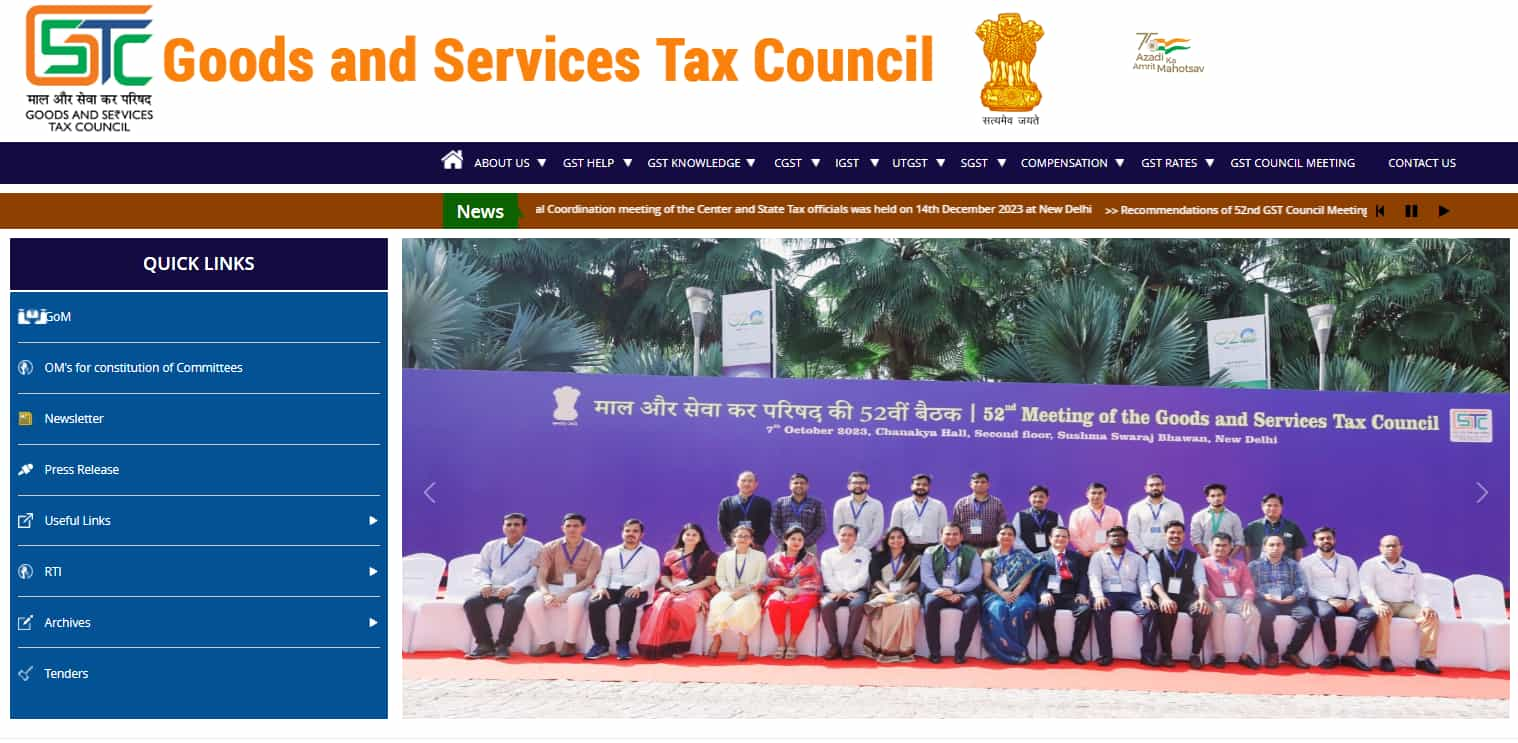The Goods and Services Tax (GST) Council is a critical decision-making body that was formed to oversee and regulate the implementation of GST in India.
Headed by the Union Finance Minister, it serves as a powerful platform for collaboration between the Central and State governments on taxation matters.
What is the GST Council?

An Overview of the GST Council:
The GST Council is responsible for:
- Recommending laws, rules, tax rates, exemptions, and more related to GST.
- Resolving disputes arising out of GST implementation.
- Addressing concerns and issues faced by states, dealers, and taxpayers.
- Ensuring a harmonized national market for goods and services.
In short, the Council spearheads India’s monumental shift towards a unified indirect tax system under GST.
Key Facts About the GST Council
- Formed on September 12, 2016, under Article 279A of the amended Indian Constitution
- Headed by the Union Finance Minister Nirmala Sitharaman
- Includes state finance ministers and Ministers of State (Revenue) as members
- Meets at least once every quarter
- Takes decisions by a majority of not less than three-fourths of the weighted votes
The Formation of the GST Council
The 101st Constitutional Amendment Act of 2016 paved the way for the revolutionary Goods and Services Tax (GST) in India. It inserted Article 279A in the Indian Constitution, mandating the formation of a GST Council within 60 days.
Accordingly, the Union Cabinet approved the creation of the GST Council on September 12, 2016. The Council conducted its first meeting on September 22-23, 2016 in New Delhi under the chairmanship of the then Union Finance Minister, Arun Jaitley.
The timely formation of the GST Council was critical for seamless collaboration between the Centre and States for rolling out GST across India.
The Vital Role Played by GST Council
As the apex decision-making authority on GST, the Council plays an indispensable role in:
Facilitating a Cooperative Federal Structure
- The GST Council fosters cooperation between the Union and State Governments by providing a common platform for constructive discussions
- It allows the Centre and States to meaningfully engage on taxation matters by sharing their concerns, objections, suggestions, and feedback
- This collaborative approach is crucial for ensuring nationwide compliance with GST laws and procedures
Promoting Tax Harmony
- By taking into account the interests of both Central and State authorities, the Council harmonizes the varied taxation approaches across India
- It aims to develop a unified national market for goods and services by introducing a streamlined tax structure
- A harmonized tax regime significantly improves the ease of doing business in India
Formulating Tax Policies and Laws
- The GST Council is primarily responsible for recommending policies and drafting laws about GST
- It decides tax rates, exemptions, area-based exemptions, GST caps and more
- The advice of the Council holds significance for both the Union and State Governments when framing GST-related Acts and Rules
Table summarizing key responsibilities discharged by the GST Council:
| Responsibility | Purpose |
|---|---|
| Recommending tax rates | Ensuring standard rates across India |
| Exempting goods and services | Removing burden for general public |
| Threshold limits | Reducing compliance burden for small businesses |
| Special rates | Raising funds for disasters or special category states |
| Compensation cess | Reimbursing states for loss of revenue |
| Laws and regulations | Developing a harmonized legal framework |
| Dispute resolution | Settling conflicts related to GST |
The Structure of the GST Council
As defined under Article 279A of the Constitution, the GST Council comprises:
Chairman
The Union Finance Minister serves as the Chairperson of the GST Council meetings and oversees procedures
Members
- Union Minister of State in charge of Revenue/Finance
- State Finance Ministers/ Taxation Ministers
One nominee from each State Government attends Council meetings as a member
Permanent Invitee
- Chairperson, Central Board of Excise and Customs (CBEC) participates in a non-voting capacity
Additional Positions
The Central Government approved the creation of the following posts:
- Ex-officio Secretary: Revenue Secretary
- GST Council Secretary: Additional Secretary rank post
- Four Commissioners: Equivalent to the rank of Joint Secretary
Both Central and State Government officers are deputed to the Secretariat assisting the Council.
Key Recommendations Made by the GST Council
Over the years, the GST Council has provided crucial recommendations related to:
Tax Exemptions
Goods and services exempt from GST:
- Unprocessed food items
- Health and education services
- Electricity
- Alcohol for human consumption
Tax Rates
- 0%: Essential items – food grains, milk, etc.
- 5%: Mass consumption goods
- 12% and 18%: Standard rates for most goods and services
- 28%: White goods, luxury items
Composition Scheme
- Small businesses with a turnover of up to Rs. 1.5 crore can opt for a composition scheme
- Eligible for 1% to 6% tax rate on turnover
Registration Threshold
- Businesses with over Rs. 40 lakh turnover must register for GST
- The limit is Rs. 20 lakh for North Eastern and hilly states
E-Way Bill Provisions
E-way bill mandated for transportation of goods worth over Rs. 50,000
GST Return Due Dates
Extended due dates for filing monthly and quarterly returns under GST
GST Compensation Cess
Imposed additional cess on sin/demerit goods to compensate states for loss of revenue
Key Features of the GST Council
Some distinctive aspects of the GST Council include:
- Headquartered in New Delhi – Hosts frequent Council meetings
- Decisions by Majority – Based on 3/4th weighted vote share
- Quorum of Half Membership – Minimum required for meeting validity
- Frequency of Meetings – Mandatory minimum of once per quarter
- Funding by Centre – Secretariat expenses are fully borne by the Central Government
- Information Exchange – Tax authorities share info with the Council digitally
- Committees – Working committees, and advisory committees assist the Council
- Transparency – Decisions and recommendations available in the public domain
A high weighted vote share implies greater decision-making authority for both the Centre and larger states in the Council.
Significant Meetings of the GST Council Over the Years
Some landmark meetings include:
- 1st Meeting (September 2016): Drafted rules for registration, payments, and refunds under GST
- 3rd Meeting (October 2016): Finalized 4-tier tax rate structure along with exemption list
- 10th Meeting (January 2017): Approved law & rules related to Composition Scheme
- 14th Meeting (June 2017): Notified all GST provisions and fixed rollout date as July 1, 2017
- 21st Meeting (July 2018): Slashed tax rates on 100+ goods and services
- 28th Meeting (July 2019): Made GST filing simpler by introducing one monthly return system
- 38th Meeting (December 2020): The first physical meeting held during COVID, with a special focus on GST compensation
- 45th Meeting (September 2022): Announced decriminalization of several procedural GST violations
Recent meetings have focused on easing compliance, eliminating tax evasion, covering revenue shortfall, and addressing inverted duties.
Composition of the GST Council
The members comprising the GST Council include:
Chairperson
- Nirmala Sitharaman, Union Minister of Finance
State Representatives
Finance Ministers of all States attend Council meetings
Central Ministers
- Ministers of State in the Ministry of Finance
- Vice Chairman of NITI Aayog
Permanent Invitees
- Chairperson, Central Board of Excise and Customs (CBEC)
The Revenue Secretary serves as Ex-officio Secretary to the Council but holds no voting rights.
How Does the GST Council Take Decisions?
- As per Article 279A, the GST Council takes all decisions by consensus
- If consensus cannot be reached within a reasonable time, decisions are taken through:
- Majority of not less than three-fourths of weighted votes
- In terms of voting weightage, the Centre has a 33% share while all States collectively hold 67% of votes
- For a decision to pass, it must have:
- Support of Central and 20 or more State representatives
- 50% or higher vote share
- The quorum required for meeting validity is half the total members
- The final decision of the Council holds precedence over earlier recommendations
This high majority threshold ensures both Central and State interests are protected.
Secretariat Assisting the GST Council
As mandated under Article 279A (9), the GST Council is supported by a Secretariat comprising of:
- Officers from Central and State Governments
- Maximum of 10 Joint Secretaries
- Maximum of 20 Deputy Secretaries / Under Secretaries
- Adequate office staff
The Secretariat of the Council is responsible for:
- Scheduling meetings
- Drafting recommendations
- Recording and circulating minutes
- Following up on action points
- Publishing Council decisions
Entirely funded by the Centre, the Secretariat enables the smooth functioning of the Council.
Frequently Asked Questions
- Q1. Who heads the GST Council?
A1. The GST Council is chaired by the Union Finance Minister of India.
- Q2. How many members does the Council have?
A2. All State Finance Ministers plus Union MoS for Finance are Council members.
- Q3. Can the Council exempt powerful lobbies from GST?
A3. No. All decisions must balance public interest and revenue considerations.
- Q4. Does the Council ensure tax uniformity across India?
A4. Yes, tax rates and regulations are recommended based on a collective approach.
- Q5. How are disputes in the Council resolved?
A5. Generally by a 3/4th majority vote share after factoring states’ interests.
- Q6. Where are official records of Council meetings maintained?
A6. Detailed minutes and decisions of the Council meetings are documented and available to the public.
- Q7. How frequently does the GST Council meet?
A7. The Council is required to meet at least once every quarter or four times annually.
- Q8. Who takes part in Council discussions?
A8. Only formal Council members can participate. Permanent invitees have no voting rights.
- Q9. Who funds the expenses of the Council?
A9. Recurring and non-recurring expenditures are fully funded by the Central Government.
- Q10. Who assists the deliberations of the Council?
A10. The Council Secretariat, comprising Central and State Government officers.
Also Check: Documents Required for Trademark Registration
Conclusion:
In the years since its formation, the GST Council has bolstered India’s cooperative federalism while spearheading tax reforms. It has standardized tax rates, eliminated geographical fragmentation of markets, increased tax compliance, and doubled taxpayer base.
With the participation of both Central and State authorities, the Council nurtures a spirit of harmonization.
Despite some disputes and delays in building consensus, the GST Council has largely delivered on its objectives.
Its quarterly meetings and majority-based decision making reflect transparency and open collaboration between stakeholders.
As India advances in its GST regime, the Council remains the torchbearer guiding policy formulation and conflict resolution.


